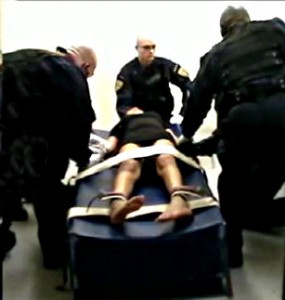
An Oklahoma Highway Patrol captain in command of troopers in seven south-central counties wants to expand the use of forced blood draws in DUI traffic stops. The initiative comes on the heals of an April U.S. Supreme Court decision that put a stop to most forced blood draws by police unless they first obtain a warrant.
The new requirement for a warrant was scarcely a speed bump for some police agencies. Prior to the July 4 weekend, officials with Troop F, headquartered in Ardmore, Oklahoma announced plans for a zero-tolerance, no refusal “Strike Teams” that would not take “no” for an answer when they asked drivers to take a chemical test during DUI traffic stops. Now a Troop F commander wants to make no refusal DUI policy standard operating procedure.
Capt. Ronnie Hampton, Troop F Commander, told a reporter for Ardmore TV station KXII he’s talking with judges and district attorneys in his area about implementing a year-round “no refusal” policy. Under Troop F’s no refusal policy, when drivers refuse to take a blood or breath test, officers use laptop computers to obtain search warrants. Once the warrant is issued, officers will forcibly obtain a blood sample whether the driver agrees or not.
So far, little or nothing has been publicly reported about the manner in which Troop F is executing forcible blood draws. Video from a Georgia television station could provide a clue.
Drivers in some metropolitan Atlanta counties who refuse a chemical test after a DUI arrest are hauled into a jail cell, strapped to a gurney and put in a martial-arts-style headlock – even if they are cooperating. In a dingy jail cell that looks anything but sanitary, surrounded by guards, a needle is stabbed into their arm. Two vials of blood are stolen from the hapless detainees. In some of those counties, drivers who refuse chemical tests are subjected to the forcible treatment whether or not they resist the chemical test after a search warrant has been issued.
A law enforcement official who answered questions from reporters at an Atlanta TV station said the forcible blood draws are their response to widely published advice from DUI defense attorneys who say drivers should exercise their right to refuse chemical tests. Oklahoma’s drunk driving law also allows drivers to refuse a chemical test, but the ability of Troop F to obtain warrants in support of their “no refusal” policy indicates some judges have been persuaded there are exceptions to that law.
Regardless the means by which police obtain a chemical test, for it to be admissible in court the state may still be required to show that the test was administered properly. An Oklahoma DUI defense attorney may file a motion to suppress evidence. Evidence resulting from improperly handled samples may be inadmissible. Even simple details – such as the use of alcohol or iodine to sanitize skin at the site where blood is drawn — can taint the evidence. Research has shown alcohol or iodine can contaminate a sample, making it unreliable. Likewise, if the chain of custody is not properly documented a DUI attorney might argue the evidence should be suppressed because the state can’t prove the blood sample was not contaminated or degraded.
Strategy Session: Tulsa DUI Attorney
If you’ve been charged with driving under the influence, you have legal rights. You have a right not to provide evidence against yourself, and to refuse a blood test. If a police agency obtains a warrant to draw blood, you must physically comply with the warrant but that does not mean the evidence collected will be admissible. Remember every detail of the procedure. Even slight details can make a difference and result in the evidence being suppressed.
For more information about your rights in a DUI case, or to talk with a skilled, experienced Tulsa DUI attorney about your case, call the Wirth Law Office for an initial strategy consultation. Call today at 1 (918) 879-1681 or toll free at 1 (888) Wirth-Law. If you prefer written correspondence, you may submit a question through the form at the top right of this page.


